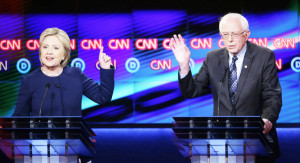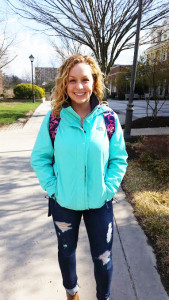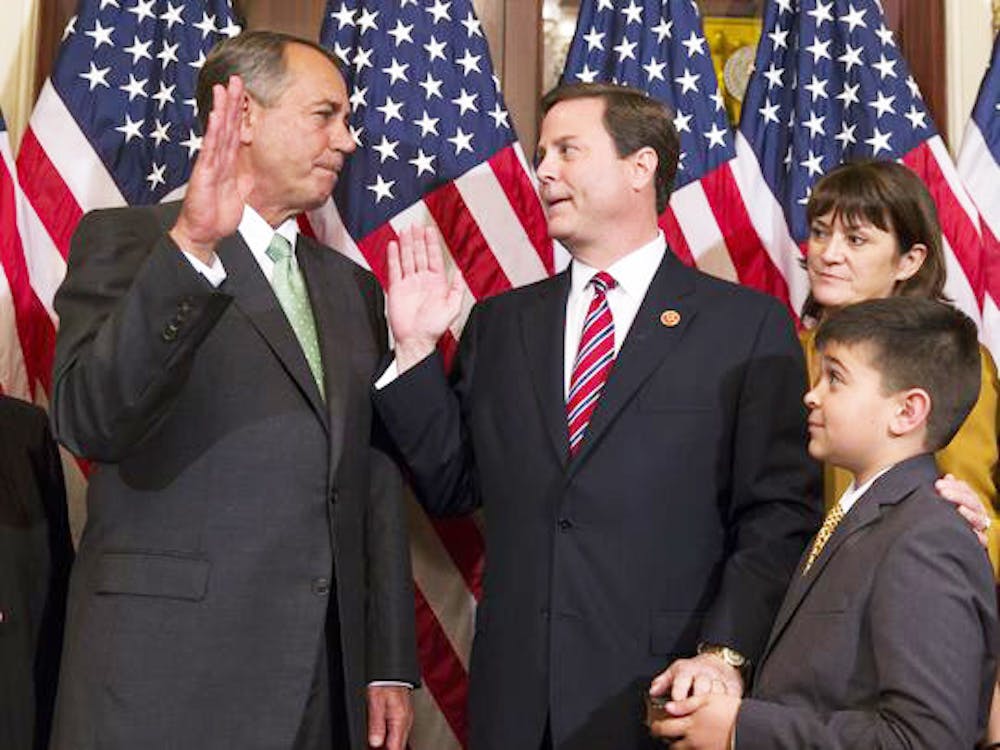By Tom Ballard
Opinions Editor
It’s spring here at the College. The flowers are out, the trees are beginning to grow foliage and finals are slowly creeping upon us. But outside the College, this season of rebirth also brings with it another type of season: primary season. With the fierce national battle between Donald Trump and the establishment of the Republican Party, and Hillary Clinton and Bernie Sanders, it is easy to overlook the other races that Republican and Democratic party members will be deciding in the upcoming primaries on Tuesday, June 7. Despite the lack of attention these local races are receiving, it is essential that voters are informed about them.
In addition to the presidential race, primary voters would be voting for their party’s candidates in the states’ 12 congressional districts and various other county and municipal races. The people elected to these positions have, arguably, more power and influence over our daily lives as average citizens than the president who oversees a wide range of issues both domestic and international.
Former Speaker of the U.S. House of Representatives Tip O’Neill is famed for saying that “all politics is local.” While O’Neill was discussing the importance for politicians to go out and meet with local residences in order to gain support, I think that this quote also aligns with the idea that it is easier for people to connect with more local politicians, since they are forced to address issues that have clear and immediate effects on the American people.
According to an Associated Press report in an article from NorthJersey.com from June 3, 2015, only approximately 5.1 percent of eligible New Jersey voters voted in their party primaries during last year’s primaries, the lowest turnout in at least 90 years. But in those primaries, the highest nominations up-for-grabs was for members of the state’s General Assembly, the lower house of the state legislature, and many candidates ran unopposed for their positions, making it seem almost unnecessary for party members to take time out of their daily lives to drag their feet to their polling station to vote. Last year’s general elections in November ended up having the lowest voter turnout for a general election in New Jersey history, with only 20.8 percent of voters taking part in their democratic right to pick their leaders, according to a nj.com article from Nov. 8, 2015.
But why did people decide not to vote? It seemed that the positions on the ballot might have something to do with it. In 2012, the last year there was a presidential election, voter turnout in the primaries hovered at around 9 percent across the state, according to the New Jersey Department of State, compared to the 5.1 percent figure from last year mentioned before. It seems that only a small amount of people actually care about the primaries at all and even less people care about it in years where only local politicians appear on the ballot.
But even a 9 percent voter turnout rate for primaries in presidential election years seem too low. Given the time of the New Jersey primaries — in June — the prospective presidential nominees of political parties are already known before anybody in the state could have access to a ballot. But people shouldn’t avoid the ballot box when only one seat seems to be locked up. More local positions have more influence on people’s daily lives, anyway. Mayors and city/township committee bodies have power over citizens to determine local tax rates and local services. County freeholders and other officials (such as sheriff, surrogate and clerk) have the power to lead the local county toward prosperity or despair. The 12 state congressmen are supposed to represent the interest of their constituents in the U.S. House of Representatives and can fight to bring great changes to local communities and the country as a whole.

The primary season thus far seems to be very intense, especially in some of the states’ congressional districts. According to a Bergen Dispatch article from Thursday, March 24, Republican Congressman Scott Garrett (5th District) has been taking a beating for his voting record. The congressman of 13 years, who is often touted as one of the most conservative in the state’s delegation, has voted against federally-funded programs for police, firefighters and public safety. Garrett is also currently facing heat for alleged comments he made last year saying that he wouldn’t contribute to the Republican Congressional Committee, the fundraising organization that raises funds to help elect Republicans to the U.S. House, if they contributed to openly-gay candidates, according to a nj.com article from July 16, 2015. Despite this, Garrett will face little opposition in the Republican primary and instead, has already been tossed into a head-to-head matchup with the perspective Democratic nominee and former Bill Clinton speechwriter Josh Gottheimer.
Even though the primary in the 5th District seems to have been placed on a hiatus, other candidates face fierce competition in their primaries, in which voter turnout can have a tremendous effect on who appears on the ballot in November.
Congressman Leonard Lance (R-7th District) is currently facing competition from three other Republicans in the June primaries, according to politickernj.com. The once-moderate Republican, who was often seen as an environmentalist, has since scurried to the right on political issues. In addition, freshman Congressman Donald Norcross (D-1st District), brother of state Democratic party powerhouse George Norcross, is facing a fierce competition from 24-year-old, Sanders-supporting Alex Law in June, according to an nj.com article from Tuesday, March 22.
While voters typically only think of primaries when they fall in presidential years, it is fundamentally important for voters, especially the young voters who will be voting in the upcoming decades, to remember that primaries are held every year. With the exception of candidates for boards of education across the state, the politicians that appear on the ballot in November only do so because they had been vetted and supported by members of the political party in June. While some may look at primaries as being typically unimportant and insignificant, they allow the people who belong to political parties to have their voices heard and choose candidates they believe can best represent their party and benefit their local communities. Primaries allow the people to have a voice in the two-party system of American politics. If Americans refuse to vote in the primaries (especially if they belong to one of the two major political parties), then they are forfeiting the right for their voices to be heard.
Students share opinions around campus
Are local elections important?

“Yeah, I wish that they have more stuff on campus (about local elections)... nobody on campus talks about them.”

“Definitely... I feel like people always complain about situations going on in their towns, but they don’t take the time to... do something about it.”







